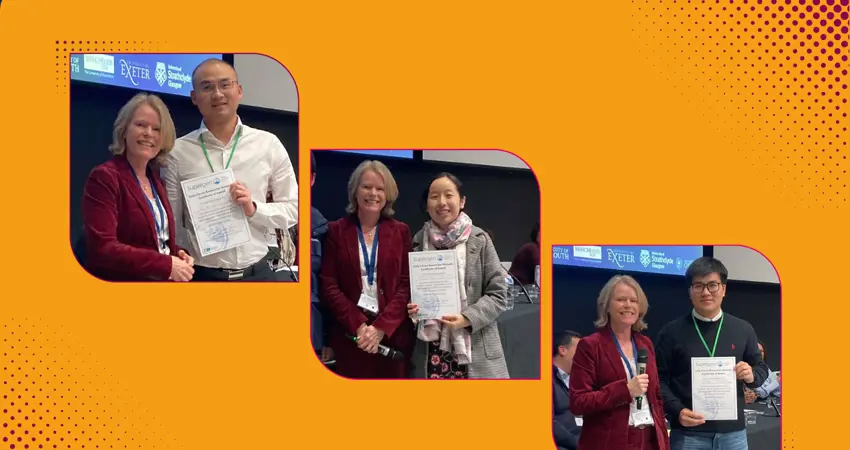03 Jul 2025
Oxford researchers acknowledged for contributions to offshore renewable energy
Our researchers and alumni featured prominently at the 2024 Supergen ORE Annual Assembly, securing Early Career Researcher poster prizes

Researchers and alumni from the Department of Engineering Science made a significant impact at this year’s Supergen Offshore Renewable Energy (ORE) Annual Assembly, the UK’s largest event focused on offshore renewable energy. Held in Manchester in April, the Assembly brought together over 200 delegates, including leading researchers, policymakers, and industry partners in wind, wave, and tidal energy.
Oxford’s contributions were visible across the programme, from expert panel participation to top research recognitions.
Professor Richard Willden, Deputy Head of Department/Chair of Faculty and Professor of Offshore Renewable Energy was invited to speak, contributing to high-level discussions on the future of offshore energy systems. Our alumna Dr Misha Patel, now Committee Specialist for the House of Commons Environmental Audit Committee, also featured in focused discussions, sharing insights from her role bridging research and policy.
The Supergen Early Career Researcher network supports a community of researchers and nurtures the next generation of offshore renewable energy research leaders through funding, events and spotlighting research. Three members of the Department also secured Early Career Researcher (ECR) prizes for their poster presentations:
- Dr Fei He – for his research on Tidal Resource Assessment for the Co-Tide Project.
- Dr Chenying Liu – for her research on Origami-Enhanced Dielectric Fluid Generator for Wave Energy Conversion
- Dr Yadong Han – for his research on Tidal Turbine Benchmarking Project: Stage II – Experiments on Unsteady Loading in Waves
Their work was recognised for its originality, technical rigour, and clear relevance to the sector’s biggest challenges. The ECR poster session was a highlight of the Assembly, providing a platform for emerging researchers to showcase innovative ideas to an expert audience.
Dr Fei He, Postdoctoral Research Assistant in Environmental Fluid Mechanics, was awarded first prize in the poster competition. His research focuses on tidal resource assessment as part of the Co-Tide Project. Dr He developed a novel multi-scale analytical predictive framework for the performance of a tidal stream turbine array in a tidal channel. This contributes to developing an integrated co-design tool, which will significantly reduce costs and enable tidal stream energy to make a significant contribution to achieving UK’s climate change objectives by 2030-2040.
Dr Chenying Liu, currently a Junior Research Fellow in Engineering at Christ Church, received second prize for her innovative work on developing an origami-enhanced dielectric fluid generator for wave energy conversion. Liu specialises in structural mechanics and robotics. Prior to taking her current position, Chenying was a Postdoctoral Research Associate in the Department of Engineering Science. Her postdoctoral work was initially based at the Podium Institute for Sports Medicine and Technology, and she also took a secondment, co-funded by Supergen ORE Hub and Wave Energy Scotland, to transfer her expertise to the wave energy sector.
Chenying's poster integrates mechanical design with energy harvesting by employing origami-inspired structures - drawing on the ancient art of paper folding -to develop scalable, controllable, and fatigue-resistant systems that will improve the performance and efficiency of wave energy generators. Chenying said: ‘‘It was a great pleasure to attend the Annual Assembly for the first time and see so much fascinating work in the ocean renewable energy sector. Receiving this award has been incredibly inspiring - it has motivated me to explore how my expertise in origami structures and robotics can be applied to meaningful innovations that contribute to a more sustainable world.’’
Dr Yadong Han, a Postdoctoral Research Assistant in Environmental Fluid Mechanics, was awarded third prize for his contribution to the experimental investigation of unsteady loading on tidal turbines in waves. His research is part of the Tidal Turbine Benchmarking Project and the Co-Tide project, which aims to improve the understanding of how wave-induced unsteady loading affects tidal turbines. This research also delivers open access benchmarking datasets for the tidal energy community, supporting the improvement of modelling accuracy and predictive capabilities. Yadong’s work plays a vital role in the development of more robust and efficient tidal energy systems, contributing to the scalability of tidal energy and helping to accelerate the transition to a net-zero future. ‘‘I’m really honoured to receive this award, which reflects the recognition of our work by the Supergen ORE Hub and the industry. We are committed to continuing our efforts to address key challenges in tidal energy sector and to contribute to achieving net-zero through marine renewables. I’m really grateful to the Supergen ORE Hub for providing the opportunity to share our research and engage with such an inspiring community of academics and industry experts.’’ said Yadong.
More about the event:
The Supergen ORE Hub, funded by UKRI’s Engineering and Physical Sciences Research Council (EPSRC), plays a central role in accelerating the UK’s transition to a low-carbon future through collaboration and knowledge-sharing across academia, industry, and government.
This year’s Assembly focused on key themes including ‘Future roadmaps for offshore energy; The role of digital innovation; Supporting early career researchers; Research alignment with government and industry need.
Beyond technical exchange, the event also served as a networking platform to support the next generation of offshore energy leaders. Oxford’s strong representation across career stages reflects the department’s growing role in shaping the UK's offshore renewable energy landscape.




